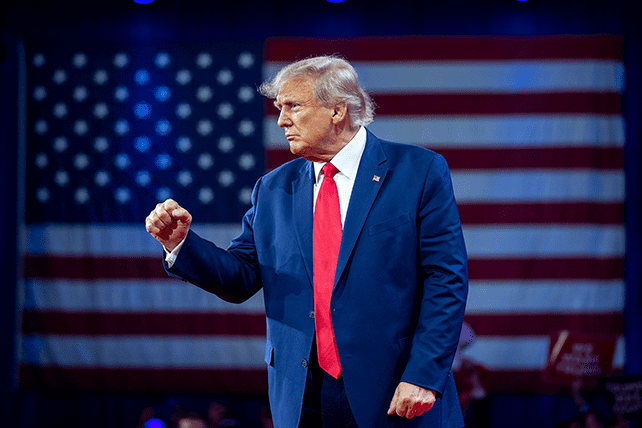WASHINGTON (RNS) — In 2017, as Donald Trump settled into the presidency thanks in no small part to broad support from conservative Christians, a Vatican-approved magazine published an article bemoaning the “surprising ecumenism” found among far-right Protestants and Catholics who sought a “theocratic type of state.”
Years later, the ideology highlighted by the article — co-authored by a confidante of Pope Francis — is often described using the umbrella term “Christian nationalism.” And as the U.S. barrels toward yet another presidential election featuring Trump, most attention has been paid to the Protestant variety: forms of evangelicalism that have become increasingly vocal about a desire to create a particular kind of Christian America.
But the movement’s Catholic cousins have also quietly continued to grow. Cousins, plural, because Christian nationalism and related ideas espoused by Catholics don’t constitute a unified ideology, experts say. There are hard-liners and extreme voices who self-identify as Christian nationalists — Nick Fuentes and his America First group, for example. There are the extra-ecclesial groups, like Eternal Word Television Network or the now-defunct Church Militant. And then there are Catholic integralists, who often insist they aren’t nationalists at all.
“Integralism was operating before any self-understood Christian nationalists were operating,” explained Kevin Vallier, an associate professor of philosophy at Bowling Green State University whose new book, “All the Kingdoms of the World: On Radical Religious Alternatives to Liberalism,” examines Catholic integralism.
The movement, Vallier said, traces its origins to the fall of the Roman Empire, when the Catholic Church took on many of the functions of the state. For generations, popes argued that God ordained two powers: kings to rule “temporal” matters and promote “ordinary natural good,” and the church to promote spiritual “eternal goods.”
“In many cases, these two divinely authorized institutions will sort of clash,” Vallier said. “The question is ‘Well, which is superior?’ The integralist says that the church is superior … and that means it can delegate to the state to help enforce its spiritual mission.”
The church began to shift away from this idea in the aftermath of World War II — and particularly after the Second Vatican Council — but there has been a resurgence of support in the 21st century in conservative academic circles. The movement found champions in University of Notre Dame’s Patrick Deneen and especially Harvard University’s Adrian Vermeule, both of whom insist liberalism has failed Western society. They and like-minded “New Right” and “post-liberal” scholars have organized their own conferences, such as a 2022 gathering at the Franciscan University of Steubenville that also featured a speech from then-U.S. Senate candidate J.D. Vance of Ohio. (Representatives for Vance did not respond to questions about whether he supports Catholic integralism.)
Integralist ideas sometimes directly conflict with ideals of self-identified Christian nationalists. Integralists are often deeply supportive of immigration, for instance, and tend to shy away from the political violence endorsed by some extreme Christian nationalists, who exhibit higher support for political violence in polls than the average American.
According to Vallier, integralists prefer a “soft power” approach to exerting Christian influence over society.
“There’s the sense that the liberal order is so corrupt that elite Catholics have to find positions of influence and use them in a kind of noble and appropriate way,” he said.
Vermeule, who previously clerked for Supreme Court Justice Samuel Alito and was appointed in 2020 by Trump to the Administrative Conference of the United States, has written about the importance of a Christian “strategic adviser” to people in power, citing examples from the Bible where religious figures advised “pagan kings.”
And while Vermeule has argued that “nationalism, in itself, is not a cause to be celebrated,” he has conceded that nationalism can be a “second-best defensive strategy” against liberalism.

